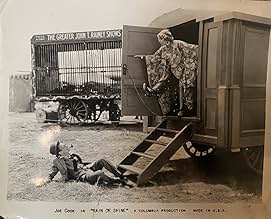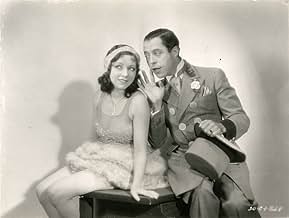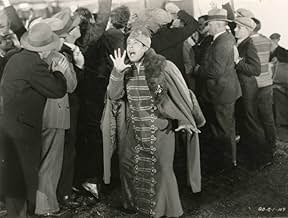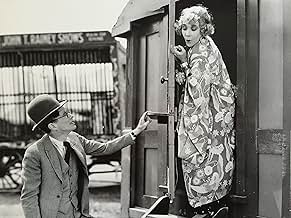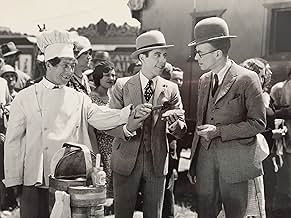Woman inherits a traveling circus which brings financial difficulties.Woman inherits a traveling circus which brings financial difficulties.Woman inherits a traveling circus which brings financial difficulties.
- Dave
- (as Dave Chason)
- Mr. Conway
- (as Edward Martindale)
- Lord Hugo Gwynne
- (as Tyrrell Davis)
- Charlie the Gorilla
- (uncredited)
- Boy at Circus
- (uncredited)
- Carmencita, The Fat Lady
- (uncredited)
- Extra
- (uncredited)
- Waiter at Dinner Party
- (uncredited)
- Director
- Writers
- All cast & crew
- Production, box office & more at IMDbPro
Featured reviews
Joe Cook as SMILEY JOHNSON saves the Circus for Louise Fazenda as FRANKIE, 'The Princess' only too see it go up in smoke in the last reel. Cook's style was that of VAUDEVILLE, where a rather overbearing character is the center of attraction and supposedly well liked. Cook is unremitting in hammering the audience with his act which does not let up for the entire picture. In fact he probably acted this way 24/7 which makes me feel sad for his significant other.
By 1930 VAUDEVILLE was on its last legs. Beginning in Circa 1880 it was a popular live entertainment particularly for the 'middle class'. By 1920 though Silent Pictures had been established as a major threat. Then mid-decade came Radio, home entertainment provided for free which many Vaudevillians took advantage of, transferring their talents too the new medium. The Great Depression and by 1930 the perfection of the Sound Film, created the death blow. The theaters that supported VAUDEVILLE either closed or converted to movies, those who could cut it either moved too film or radio. As for live performance, you were either on Broadway or you did not count at all. Cook continued with success on Broadway where his style of acting could be tolerated. Film definitely was not his medium.
Most of the blame for this film being so terrible and tough to watch falls on the shoulders of its director, Frank Capra. While Capra did great things for Harry Langdon during the silent era and from the mid-1930s on he made some of the most iconic American films of the era (IT HAPPENED ONE NIGHT, MR. SMITH GOES TO WASHINGTON, MEET JOHN DOE and many others), but even great directors have their duds--and this film was definitely a dud.
The film is nominally about a circus that is chronically on the verge of bankruptcy. However, the entire show was the vaudevillian, Joe Cook. While one of the reviewers thought that Cook was hilarious, he was simply too much--like a giant migraine. He talked and talked and talked and talked. If you liked this sort of in your face routine again and again, then you'd probably like the film. However, I didn't think he was funny and felt the director should have placed more emphasis on the talented members of the cast. That, or simply punched Cook in the mouth and told him to shut the heck up!! Terrible pacing, annoying dialog and nothing to like--this is truly one of the most painful films I have seen. I only kept watching because I assumed it would get better---it didn't.
Frankie (Louise Fazenda) has inherited her father's circus upon his death, and the first season with her in charge is coming to a ruinous close. Her circus manager Smiley (Cook), a jokey fellow who always has a line to try and cheer her up, is optimistic about the future, an optimism shared by Bud (William Collier, Jr.), Frankie's beau (though there seems to be a conflict between the two men for Frankie's heart, though it comes to nothing) because they are coming upon his hometown of Shrewsberry where they'll get great crowds and turn things around. At the same time, the star horse rider, Dalton (Alan Roscoe), and band leader, Foltz (Adolph Milar), conspire to pool their resources and ideas to buy the circus out from Frankie when she hits a bad moment.
You see, this story is surprisingly serious, and I bring up the Marx Brothers because they were being introduced to the world in the early sound era through adaptations of their stage plays that were relentless applications of vaudeville comedy. We get that in sections mainly through the interactions of Smiley with the local Amos K. Shrewsberry (Tom Howard) with whom he develops a twisted little relationship based on Smiley's fast talking style to con him out of thousands of dollars while Shrewsberry just sticks around in befuddled style. However, that gets intercut with this stuff around Frankie dealing with the finances, her relationship with Bud, and her attempt to enter high society of Shrewsberry that Smiley completely ruins.
What helps the film is that it allows Cook to do his thing for long stretches. He really does remind me of some combination of Groucho and Harpo Marx (mainly because he does the hat in the foot thing once). He's a fast talker that has his own bits that he plays all the way through, mostly to Howard who works so well with Cook that I assumed they were a team. How Smiley talks Shrewsberry into handing over $5,000 is just a wonderful display of rhetorical excess. How Shrewsberry tries to mimic it later is the work of a talented performer as well. This movie rises and falls on its comedy, and I just wish there was more of it.
Because when the plot reappears with Frankie getting all angry at Smiley for ruining the big dinner, it just feels so out of place. I was thinking of how Margaret Dumont always reacted to Groucho, just kind of accepting his manic behavior as largely normal and continuing on with the action of the plot, and how much that worked as opposed to these starts and stops of earnestness in the face of ridiculousness.
However, I will give the film credit for the scale of its ending. Dalton and Foltz execute their plan to get Frankie desperate and sell the circus to them (considering the crowds, it doesn't make the most sense, but okay), and all chaos erupts, reminding me of the ending to Capra's first film, the Harry Langdon starring The Strong Man. There's something to be said about the sheer amount of chaos unleashed. It's kind of fun to watch.
There's also a very late moment when, in the detritus of the chaos, Smiley and Shrewsberry calmly sit together and go through one of their routines in a quiet manner, which seems to be the one point in the film where the two diametrically opposing tonal forces of the film actually meet. It doesn't lead to anything, but it's a surprisingly nice moment.
So, the dramatic elements are not that good, never really go anywhere, and kind of half-formed at best. However, the comedy is generally pretty good and fun to watch. I just wish that Capra had changed the source material (a musical play by James Gleason and Maurice Marks) more than by cutting out the musical numbers to make it an outright comedy. But, what do I know? It was apparently a box office success.
By the time this film went into production, the vogue for musicals was over, so all the songs were cut from the film (a common occurrence in 1930). Still, there was enough plot to carry the 90-minute film.
Joe Cook was the star. The long-forgotten, Cook was a major star on Broadway. His nickname was "the one-man vaudeville" because he could sing, dance, do comedy, and perform a series of juggling tricks. Cook made his film debut in a 1929 talkie short called AT THE BALLGAME.
In RAIN OR SHINE he plays the fast-talking manager of a failing circus owned by a girl (Joan Peers) who inherited it from her father. Two employees are in cahoots to ensure the circus fails so they can take it over. In a weak subplot, Peers and her boyfriend (William Collier, Jr.) attend a disastrous dinner party at his snooty parents' mansion.
Cook is front and center through most of the film as he attends to all the problems and egos under the big top. There's also a funny running gag with Cook and a local citizen (Tom Howard) and how he becomes a partner with the help of the Princess (Louise Fazenda).
The finale is quite exciting after the bank attaches the day's receipts and the performers realize they won't get paid. Cook is terrific in a series of circus tricks as he tries to put on a big-top show all by himself. Peers and Collier are OK as the young lovers, Fazenda has little to do, Howard is funny as the local, and Dave Chasen (who founded the famous restaurant) is funny as the stooge.
Did you know
- TriviaThe main character, Smiley Johnson, explains to Tom Howard that he was born in Evansville, Indiana. In fact, Joe Cook, the actor who played Smiley, was born in Evansville, Indiana.
- Quotes
Amos K. Shrewsberry: Just a minute. I want to see you. I've got a feed bill here I want to talk to you about.
Smiley Johnson: Say, brother, you certainly were a big help to me. Now, I know what you're gonna say, you're modest and you want to make me believe you don't have it all. I want all these good folks to know what a great guy you are. You're not the mayor here, are you? You know the minute I laid eyes on you, I says to myself, now there's a man who looks just like Jimmy Walker and he should ought to be mayor of this cute little town.
Amos K. Shrewsberry: No, I'm not the mayor, but I'd like to see you inside alone.
Smiley Johnson: Alone? That will be impossible, I'll be with you.
- Alternate versionsWhen this film was produced, not all theaters had converted to the "sound on film" system. Also, some of the dialogue was too lengthy to include on inter-titles or referenced things unfamiliar to foreign audiences. To address these issues, Columbia and other studios filmed foreign and domestic versions simultaneously with the same cast. (They would soon switch to filming separate versions, utilizing the same sets but different casts as was the case with the Spanish version of Universal's "Dracula.") The 68 minute "silent" international version is included on the Turner "Frank Capra: the Early Collection" set. (Some spoken dialogue remains without any title cards, mainly in the climatic fire sequence.) Most of the banter is eliminated but additional tricks and stunts have been added. Although both versions were directed by Capra (usually there were separate crews), the international version has additional scenes fleshing out the Ringmaster's machinations. It also features an alternate ending to the domestic version.
- ConnectionsFeatured in Charlie Gemora: Uncredited (2016)
- SoundtracksHappy Days Are Here Again
(1929) (uncredited)
Music by Milton Ager
Played during the opening and credits and at the end
Also played at a circus performance
Details
- Release date
- Country of origin
- Language
- Also known as
- Pasa el circo
- Filming locations
- Burbank, California, USA(ranch: James J. Jefferies')
- Production company
- See more company credits at IMDbPro
- Runtime
- 1h 28m(88 min)
- Color

